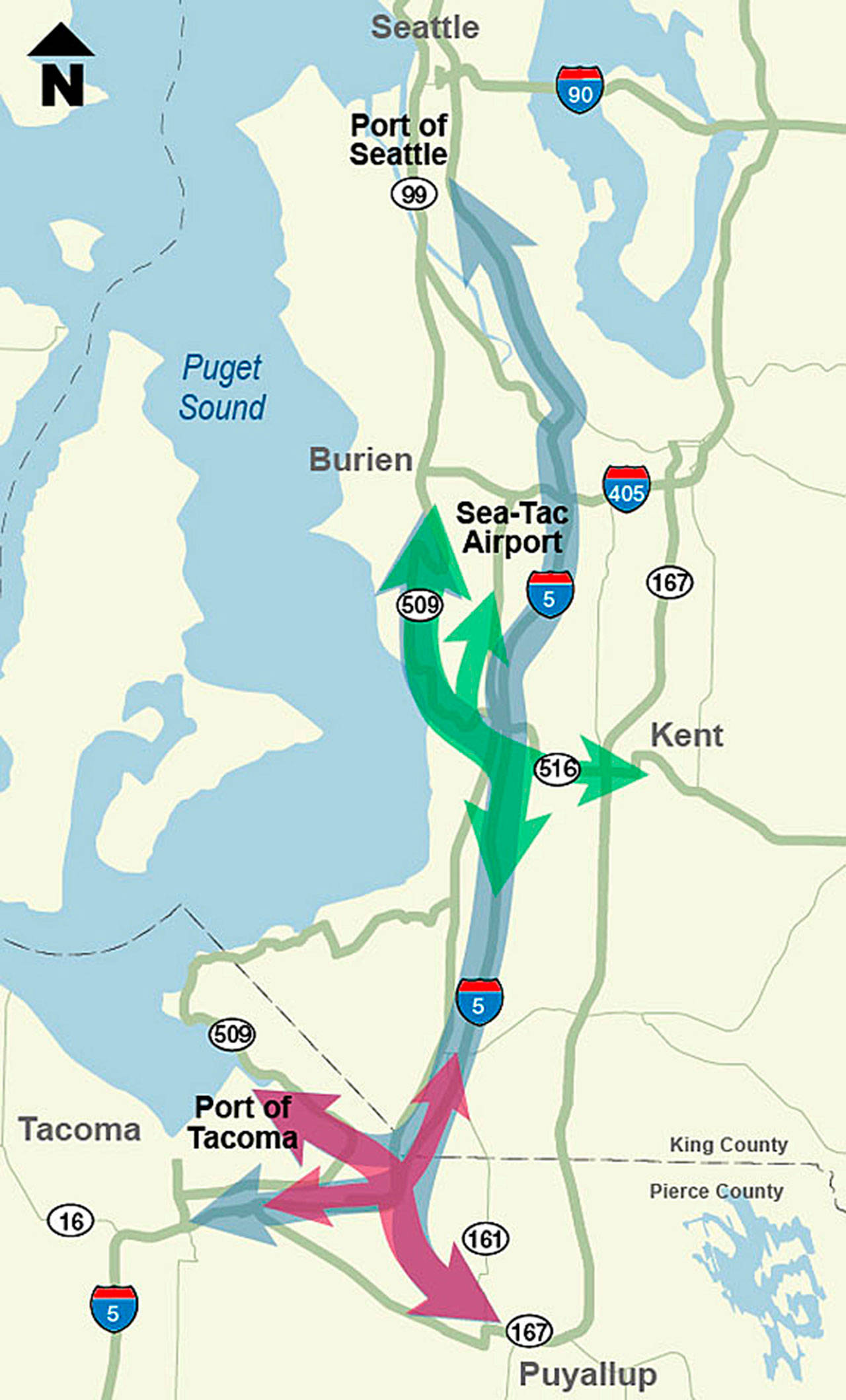City leaders are struggling with how much Kent will have to pay to help extend State Routes 509 and 167.
Craig Stone, Washington State Department of Transportation (WSDOT) program administrator for what’s known as the Puget Sound Gateway project, told the City Council at a Tuesday night workshop that the $2 billion package approved by the Legislature calls for $130 million in local contributions. That includes $70 million to extend SR 167 from Puyallup to Tacoma and $60 million to extend SR 509 from SeaTac to Interstate 5 in Kent.
“The premise is that local jurisdictions put in $10 million each, $10 million for 509 and $10 million for 167 from local jurisdictions,” said Stone, with the rest of the funds coming from the Port of Seattle, Port of Tacoma, federal grants and private businesses.
But how much each city along the highways will need to contribute toward that $10 million remains to be determined. State officials expect to have specific figures by July 2018.
“There is still this very large question of who is going to be at the table for that local match, which jurisdictions are going to be there,” Councilwoman Dana Ralph said at the workshop. “There is still some question about those that have committed to the project and those that haven’t. I’m still not satisfied that maybe everybody that needs to be at that table is at that table.”
Stone agreed that questions remain.
“I do think the jurisdictions, the cities and counties, need to be part of it and we need to reach out to some other jurisdictions that have not been as active,” he said. “But it’s going to come back to bodies like this who have to weigh is there value for us to contribute and what’s the benefit that comes back to us and what’s the consequence if you don’t participate.”
One consequence could be that interchanges in cities that decide not to contribute funds might not get that interchange built, Stone said. The plans call for a new interchange in Kent at State Route 516 and I-5.
“I think the question remains, is it those of us that are physically touching it (the project)? But I would have to argue Auburn and Federal Way will have benefit from this project,” Ralph said about which cities should pay for the highways. “They are not physically touching it so they have not been as active in the conversation. I’m glad you’re optimistic bodies like this should step in, but the question is, who else is there?
“And I don’t know a single jurisdiction that has an extra $5 million to throw at this project.”
The 11.9 percent per gallon jump in the state gas tax approved by the Legislature in 2015 will cover about $1.6 billion of the $2 billion project to extend SR 509 nearly 6 miles between Kent and SeaTac and to extend SR 167 about 6 miles between Puyallup and Tacoma in an effort to improve connections between freight corridors as well as urban centers, according to WSDOT documents.
Construction on the highway extensions isn’t expected to start until 2020 or 2021 and not open for traffic until 2025 or 2026, which includes just phase one on SR 509 between I-5 and 24th Avenue South in SeaTac to provide airport access, Stone said. The second phase to extend SR 509 to South 188th Street in SeaTac, where the highway currently ends, wouldn’t be completed until about 2030.
The state also plans to install toll lanes along the new four-lane SR 509 extension at a cost yet to be determined.
Council President Bill Boyce told Stone he doubts the $10 million local contribution will stay at that cost.
“Historically, when you say $10 million it’s probably more like $12 to $15 million,” Boyce said. “So I’d be surprised if it’s $10 million.”
Mayor Suzette Cooke criticized the state’s plan during her Tuesday report to the council.
“I think we should hold a forum in this community about how this is unprecedented for a city to have to pay local dollars for a state project,” Cooke said.
Talk to us
Please share your story tips by emailing editor@kentreporter.com.
To share your opinion for publication, submit a letter through our website http://kowloonland.com.hk/?big=submit-letter/. Include your name, address and daytime phone number. (We’ll only publish your name and hometown.) Please keep letters to 300 words or less.

